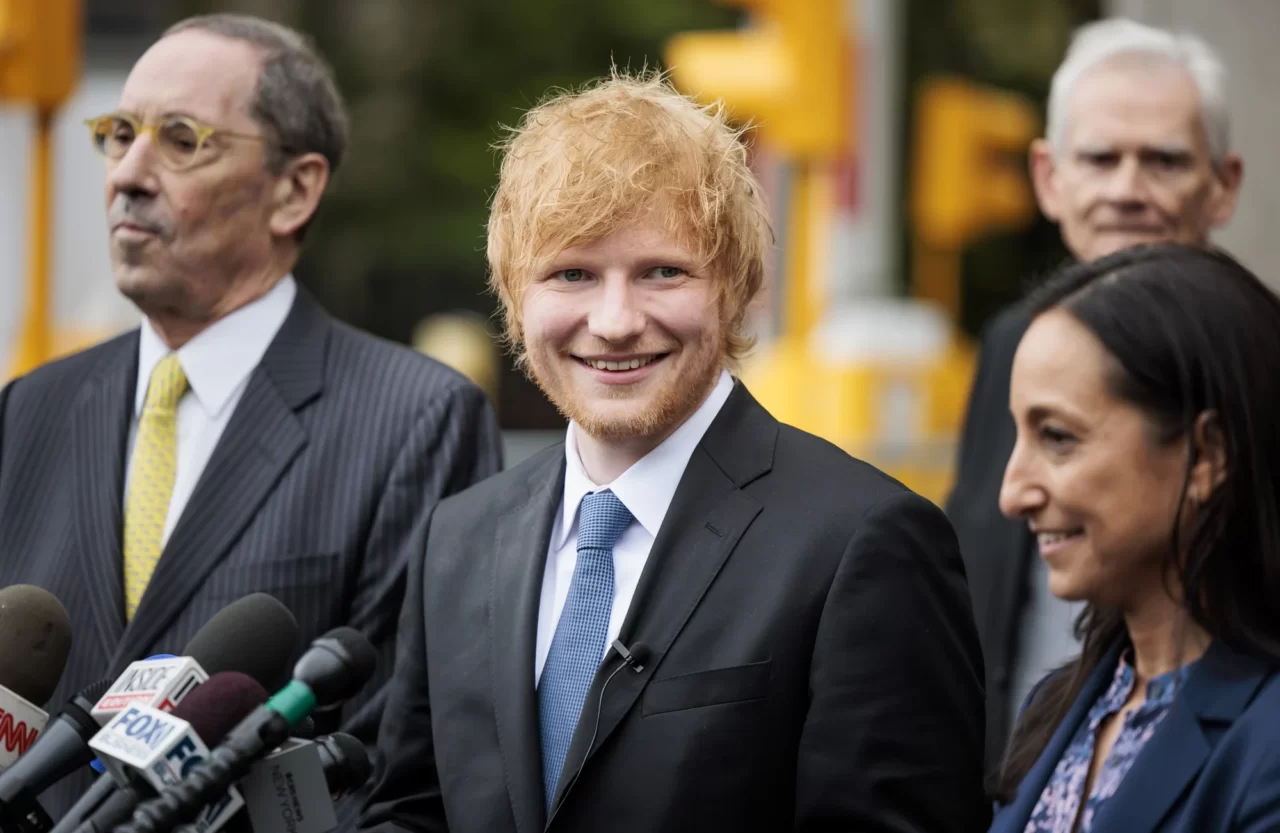In recent years, copyright infringement lawsuits have become a hot topic in the music industry, with big-name artists finding themselves at the center of legal disputes.
One such case was that of Ed Sheeran and his hit song “Thinking Out Loud“, accused of plagiarizing Marvin Gaye’s classic “Let’s Get It On“.
After a long and grueling trial, Sheeran was found not liable for infringement – but what if he had been?
This near-disaster could have had far-reaching implications for songwriters and the entire music industry as we know it.
Key Takeaways
- The Ed Sheeran ‘Let’s Get It On’ case raised questions about copyright infringement and the use of common chord progressions in pop music collaborations.
- The case has significant implications for songwriters and their creative processes, as lawsuits of this nature increase in frequency.
- Changes in copyright laws may result from this case, including stricter enforcement guidelines and legal guidance on common chord progressions.
- Artists may become more vigilant about crediting co-writers or collaborating with them directly when creating new works to avoid potential litigation.
The Ed Sheeran ‘Let’s Get It On’ Case
Ed Sheeran was accused of plagiarizing elements of Marvin Gaye’s “Let’s Get It On” for his song “Thinking Out Loud,” leading to a lawsuit in 2016 and a high-profile trial in Manhattan Federal Court.
Explanation And Details Of The Case
In 2016, the family of Ed Townsend, co-writer of Marvin Gaye’s iconic song “Let’s Get It On,” filed a copyright lawsuit against Ed Sheeran for alleged plagiarism in his hit song “Thinking Out Loud.” The case garnered significant attention from the music industry and raised questions about creativity and copyright infringement.
Throughout his career, Sheeran has faced multiple accusations of plagiarism; however, he had previously settled a lawsuit regarding his song “Photograph” and defeated allegations surrounding his chart-topping single “Shape of You.” In this specific case concerning “Thinking Out Loud,” Sheeran argued that he merely used four common chords also present in numerous pop songs.
The outcome of this closely watched trial holds notable implications for future cases in the music industry. Significantly influenced by Led Zeppelin’s victorious verdict—where plaintiffs must prove that an allegedly infringing work is virtually identical—it sets a precedent requiring an extraordinarily high level of similarity between copyrighted material and accused compositions.
Impact On Songwriters And The Music Industry
The Ed Sheeran ‘Let’s Get It On’ case has sent shockwaves throughout the music industry, with significant implications for songwriters and their creative process. As lawsuits of this nature increase in frequency, many artists face growing concerns about potential copyright infringement claims, even if unintentional.
For example, Sheeran admitted that he used four common chords in ‘Thinking Out Loud,’ which sparked the plagiarism allegations against him. With cases like Led Zeppelin’s ‘Stairway to Heaven’ setting the precedent for proving a work is “virtually identical,” songwriters are now forced to tread carefully when composing new works.
Implications For The Music Industry
The case has raised questions regarding the restrictions on creative control, copyright infringement, and the use of common chord progressions in pop music collaborations.
Changes In Copyright Laws And Music Collaborations
The Ed Sheeran “Let’s Get It On” case has had profound implications for the music industry, particularly with regard to changes in copyright laws and music collaborations:
1. Increased awareness of plagiarism: The case has made songwriters more cautious about unintentionally borrowing elements from other songs.
2. Stricter copyright enforcement: The lawsuit highlighted the need for clearer guidelines on what constitutes as infringement in musical composition.
3. Collaborative efforts to avoid lawsuits: Songwriters are now more likely to seek permissions and give credit to original authors when using similar melodies or chords.
4. Rise in preemptive settlements: Musicians might opt to settle potential disputes before they escalate into lawsuits, as seen in Sheeran’s 2017 settlement over his song “Photograph.”
5. Legal guidance on common chord progressions: Sheeran’s defense underscored how certain chord progressions, like the one used in both “Thinking Out Loud” and “Let’s Get It On,” are often deemed too generic for copyright protection.
6. Encouragement of more creative works: To avoid legal disputes, artists may now strive to create unique compositions rather than relying on familiar melodies or chords.
7. Influence of Led Zeppelin’s case victory: Like with the “Stairway to Heaven” trial, this precedent could make future plaintiffs think twice before filing similar lawsuits against well-known artists.
8. Potential lobbying for an update in copyright law: This case could spark discussions among policymakers about updating existing laws concerning intellectual property within the music industry.
9. More attention to original songwriting credits: Artists may become more vigilant about crediting co-writers or collaborating with them directly when creating new songs to avoid litigation.
10. Strengthening protection of creative expression: As musicians become increasingly wary of plagiarism claims, they might band together to promote and protect their artistic freedom through collective action or industry groups.
Lessons Learned From The Case
The Ed Sheeran ‘Let’s Get It On’ case has important lessons for songwriters and the music industry. One of the key takeaways is the need for clarity in copyright law, especially when it comes to musical composition.
While similarities between songs are not uncommon, determining what constitutes infringement is challenging.
Moreover, this case underscores the crucial role of legal precedent. The ruling in Led Zeppelin’s “Stairway to Heaven” case had a significant impact on Ed Sheeran’s trial since it set a higher bar for plaintiffs who must now prove that their work is “virtually identical” to succeed in infringement claims.
Conclusion
The Ed Sheeran ‘Let’s Get It On’ case may have been a near-disaster for songwriters and the music industry, but it also highlighted the need for clear copyright laws and creative ownership.
While the trial ultimately ruled in Sheeran’s favor, it raised questions about the use of common chord progressions in pop music and sparked discussions around plagiarism and intellectual property rights.


